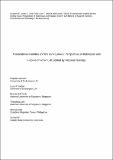Files in this item
Transnational families and the family nexus : perspectives of Indonesian and Filipino children left behind by migrant parent(s)
Item metadata
| dc.contributor.author | Graham, Elspeth | |
| dc.contributor.author | Jordan, Lucy | |
| dc.contributor.author | Yeoh, Brenda | |
| dc.contributor.author | Lam, Theodora | |
| dc.contributor.author | Asis, Maruja | |
| dc.contributor.author | kamdi, Su | |
| dc.date.accessioned | 2013-03-16T16:01:01Z | |
| dc.date.available | 2013-03-16T16:01:01Z | |
| dc.date.issued | 2012 | |
| dc.identifier | 4809382 | |
| dc.identifier | eb49453d-6d4d-453b-8715-ddd85f0689ff | |
| dc.identifier | 84864270418 | |
| dc.identifier | 000304386600004 | |
| dc.identifier.citation | Graham , E , Jordan , L , Yeoh , B , Lam , T , Asis , M & kamdi , S 2012 , ' Transnational families and the family nexus : perspectives of Indonesian and Filipino children left behind by migrant parent(s) ' , Environment and Planning A , vol. 44 , no. 4 , pp. 793-815 . https://doi.org/10.1068/a4445 | en |
| dc.identifier.issn | 0308-518X | |
| dc.identifier.uri | https://hdl.handle.net/10023/3402 | |
| dc.description.abstract | As a significant supplier of labour migrants, Southeast Asia presents itself as an important site for the study of children in transnational families who are growing up separated from at least one migrant parent and sometimes cared for by ‘other mothers’. Through the often-neglected voices of left-behind children, this paper investigates the impact of parental migration and the resulting reconfiguration of care arrangements on the subjective well-being of migrants’ children in two Southeast Asian countries, Indonesia and the Philippines. We theorise the child’s position in the transnational family nexus through the framework of the ‘care triangle’, representing interactions between three subject groups – ‘left-behind’ children, non-migrant parents/other carers, and migrant parent/s. Using both quantitative (from 1,010 households) and qualitative (from 32 children) data from a study of Child Health and Migrant Parents in South-East Asia (CHAMPSEA), we examine relationships within the caring spaces of both home and transnational spaces. The interrogation of different dimensions of care reveals the importance of contact with parents (both migrant and non-migrant) to subjective child well-being, and the diversity of experiences and intimacies among children in the two study countries. | |
| dc.format.extent | 23 | |
| dc.format.extent | 438932 | |
| dc.language.iso | eng | |
| dc.relation.ispartof | Environment and Planning A | en |
| dc.subject | Transnational families | en |
| dc.subject | Child well-being | en |
| dc.subject | Care triangle | en |
| dc.subject | Indonesia | en |
| dc.subject | Philippines | en |
| dc.subject | HN Social history and conditions. Social problems. Social reform | en |
| dc.subject.lcc | HN | en |
| dc.title | Transnational families and the family nexus : perspectives of Indonesian and Filipino children left behind by migrant parent(s) | en |
| dc.type | Journal article | en |
| dc.contributor.sponsor | The Wellcome Trust | en |
| dc.contributor.institution | University of St Andrews. Geography & Sustainable Development | en |
| dc.contributor.institution | University of St Andrews. School of Geography and Geosciences | en |
| dc.identifier.doi | 10.1068/a4445 | |
| dc.description.status | Peer reviewed | en |
| dc.identifier.grantnumber | 079946/B/06/Z | en |
This item appears in the following Collection(s)
Items in the St Andrews Research Repository are protected by copyright, with all rights reserved, unless otherwise indicated.

